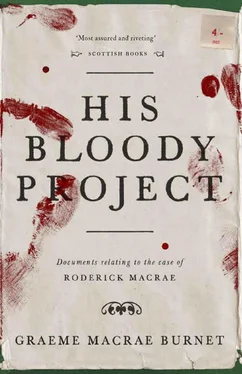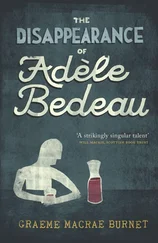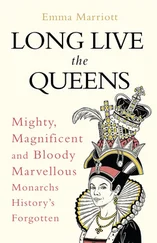Graeme Burnet - His Bloody Project
Здесь есть возможность читать онлайн «Graeme Burnet - His Bloody Project» весь текст электронной книги совершенно бесплатно (целиком полную версию без сокращений). В некоторых случаях можно слушать аудио, скачать через торрент в формате fb2 и присутствует краткое содержание. Год выпуска: 2015, Издательство: Contraband, Жанр: Современная проза, на английском языке. Описание произведения, (предисловие) а так же отзывы посетителей доступны на портале библиотеки ЛибКат.
- Название:His Bloody Project
- Автор:
- Издательство:Contraband
- Жанр:
- Год:2015
- ISBN:нет данных
- Рейтинг книги:5 / 5. Голосов: 1
-
Избранное:Добавить в избранное
- Отзывы:
-
Ваша оценка:
- 100
- 1
- 2
- 3
- 4
- 5
His Bloody Project: краткое содержание, описание и аннотация
Предлагаем к чтению аннотацию, описание, краткое содержание или предисловие (зависит от того, что написал сам автор книги «His Bloody Project»). Если вы не нашли необходимую информацию о книге — напишите в комментариях, мы постараемся отыскать её.
A brutal triple murder in a remote northwestern crofting community in 1869 leads to the arrest of a young man by the name of Roderick Macrae. There’s no question that Macrae is guilty, but the police and courts must uncover what drove him to murder the local village constable.
And who were the other two victims? Ultimately, Macrae’s fate hinges on one key question: is he insane?
His Bloody Project — читать онлайн бесплатно полную книгу (весь текст) целиком
Ниже представлен текст книги, разбитый по страницам. Система сохранения места последней прочитанной страницы, позволяет с удобством читать онлайн бесплатно книгу «His Bloody Project», без необходимости каждый раз заново искать на чём Вы остановились. Поставьте закладку, и сможете в любой момент перейти на страницу, на которой закончили чтение.
Интервал:
Закладка:
‘If one was to accept the prisoner’s own version of events, then one could reasonably conclude that he was labouring under this condition, yes.’
This ‘being a point of utmost significance’, the Lord Justice-Clerk asked the witness to clarify his answer.
Addressing himself directly to the judge, Mr Thomson continued. ‘It is quite commonplace in many disciplines, my own included, for ideas to become accepted as fact merely by virtue of being oft-repeated. In the present case, I fear that a certain narrative — namely, that the prisoner committed these acts in order to deliver his father from what he perceived to be the oppressive acts of Mr Mackenzie — has, through force of repetition, been unthinkingly accepted by the court and various witnesses. And yet this story is entirely dependent on the statements of a solitary witness: the prisoner himself. I myself, see no particular reason to accept that version of events, or at least not to subject it to thorough scrutiny.’
The Lord Justice-Clerk: ‘And have you subjected it to such scrutiny?’
‘I have.’
‘And what is your opinion?’
‘My opinion is that there is no reason to believe the words of an individual who, by his own admission, has committed the most sanguinary deeds. And furthermore, that an alternative explanation provides a more plausible account of his actions.’
Mr Sinclair was by this time unable to conceal his anxiety. He moved to interrupt the judge’s line of questioning, but was immediately silenced.
The Lord Justice-Clerk: ‘And do you have such an explanation?’
‘I do,’ said Mr Thomson.
‘Then I would ask you to share it with the court.’
‘My view is based on inconsistencies and omissions in the account the prisoner repeated both to Mr Sinclair and to myself. Specifically, these inconsistencies regard the injuries inflicted on Flora Mackenzie, which, to my mind, speak of an altogether different motive for the crimes committed. It would be my contention that when the prisoner embarked on his bloody project, his true purpose was not to avenge himself on Mr Mackenzie, but on this gentleman’s daughter, who, as we have heard, rejected his lewd advances towards her. In this account, Roderick Macrae was driven not by a quasi-noble desire to protect his father, but by his sexual urges towards Miss Mackenzie. I would thus contend that the prisoner set out in full knowledge that Mr Mackenzie was not at home and proceeded to violate his daughter in the most depraved way. Then, disturbed in his actions, a struggle ensued resulting in Mr Mackenzie’s death.’
There were a few moments of silence, followed by an outbreak of whispered commentary from the gallery. The judge struck his gavel repeatedly to restore order. Mr Sinclair appeared quite lost.
The Lord Justice-Clerk: ‘And why should one believe this version of events over the one previously given?’
‘Clearly I was not present when these deeds were committed,’ Mr Thomson continued, ‘but the injuries inflicted on Miss Mackenzie are entirely inconsistent with the motive described by the prisoner. Furthermore, when I questioned the prisoner in his cell, it was only at the mention of these injuries that he exhibited any sign of anxiety. A fissure appeared in the persona he had presented to the world.’
The Lord Justice-Clerk then looked to the crestfallen Mr Sinclair to continue his examination. The judge, no doubt conscious of the gravity of the witness’s statements, allowed him some moments to gather his thoughts. After some consultation with his associate, Mr Sinclair continued.
‘Were we to accept such a version of events, would it not speak even more profoundly of a loss of reason than the version that has previously been put forward?’
Mr Thomson gave the advocate a thin smile, aware that he was endeavouring to salvage his case from the implications of his testimony. ‘It may be that in a straightforward case of a sexually motivated attack, one may or may not deem the offender, in his inability to control his base urges, not to be fully responsible for his actions. This case, however, is distinguished not by the nature of the crime itself, but by the dissembling nature of the perpetrator’s statements after the fact. Had he admitted outright to the motives for his attack, he might, as you say, be deemed morally insane, as he would not have known that the acts he had committed were wrong. However, in fabricating an alternative explanation — an explanation which seeks to cloak his actions in a guise of righteousness — the perpetrator betrays his knowledge of the shameful nature of his real objective. It is the concealment of his true motives for these murders which reveals his knowledge that what he did was wrong. Those unfortunate persons who labour under the condition of moral insanity, are entirely unable to distinguish right from wrong. They sincerely believe whatever foul deeds they commit to be justified. In the present case, however, the motive claimed by the accused speaks not only of a desire to obscure the true purpose of his attack, but of an ability to deceive and dissemble which is not present in those whom one would deem insane.’
‘If, however,’ said Mr Sinclair, in a valiant attempt to rescue his case, ‘the version of events given by the accused, in the immediate aftermath of the assault, was accurate, you would judge him to be insane?’
‘I would.’
‘And since neither you nor any other witness was present at the attack, you cannot say with any certainty that the prisoner’s account is any less true than the one you have put forward.’
‘You are quite correct, sir, to point out that I was not present. However, the version of events I have presented accords more accurately with the physical evidence of the case. Had the defendant’s motives been as he has claimed, there would have been no reason to inflict such dreadful injuries on the unfortunate Miss Mackenzie. Even if he had felt the need to subdue her before lying in wait for her father to return, a blow to the head to render her unconscious would have been sufficient. Instead, he chose to wickedly defile her. I do not see any relation in this action to his professed desire to deliver his father from the tribulations he had supposedly endured at the hands of Mr Mackenzie.’
‘But you must admit that another interpretation of the prisoner’s actions is possible?’
‘Other interpretations may be possible, but they do not properly account for the facts of the case.’
At this point Mr Sinclair resumed his seat and it was necessary for the Lord Justice-Clerk to ask if he had concluded his questioning. The Crown declined the opportunity to examine the witness and Mr Thomson was excused. The court was adjourned until the afternoon, when the closing statements would be put to the jury.
The Crown summation did not last more than an hour and was delivered by Mr Gifford with ‘an air of complacency, which some jury members might have felt quite alienating’. The Solicitor-General asked that the jury attend only to the facts of the case. Roderick Macrae had carried out his acts in a pre-meditated manner — evidenced by the fact that he had gone armed to the Mackenzie home — and killed three blameless individuals in a ‘frenzied act of the utmost brutality’.
‘Mr Sinclair will try to pull the wool over your eyes,’ he said. ‘He will attempt to portray his client as an imbecile, given to talking to himself and hearing voices in his head.’ He reminded them that ‘while the prisoner might occasionally have been given to eccentric behaviour, not a single witness — excepting Aeneas Mackenzie — has been willing to testify that he was insane. And Mr Mackenzie’s opinion, for what it was worth, appeared to be based on no more than an understandable dislike of the prisoner and the fact that he sometimes laughed inappropriately. I would put it to you, gentlemen, that if that were all that was required as a diagnosis of insanity, we would all be in the asylum. Instead, I would suggest that far greater weight be placed on the evidence of the Mrs Carmina Murchison, who testified that when she conversed with Roderick Macrae only minutes before he committed his crime, he was, in her words, “perfectly rational”.’
Читать дальшеИнтервал:
Закладка:
Похожие книги на «His Bloody Project»
Представляем Вашему вниманию похожие книги на «His Bloody Project» списком для выбора. Мы отобрали схожую по названию и смыслу литературу в надежде предоставить читателям больше вариантов отыскать новые, интересные, ещё непрочитанные произведения.
Обсуждение, отзывы о книге «His Bloody Project» и просто собственные мнения читателей. Оставьте ваши комментарии, напишите, что Вы думаете о произведении, его смысле или главных героях. Укажите что конкретно понравилось, а что нет, и почему Вы так считаете.












